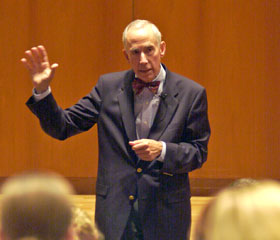For more archives, go to the Advance Archive/Search Page.
Service Learning Enhances Coursework
In service learning, the students are serving the community, and the community, in turn, is teaching the students, according to Thomas Ehrlich, a senior scholar at the Carnegie Foundation for the Advancement of Teaching.
Ehrlich, who has been called “the father of service learning,” gave a presentation on the topic on Oct. 14. He is helping UConn establish a service learning program on campus.
 |
|
Thomas Ehrlich, a senior scholar at the Carnegie Foundation for the
Advancement of Teaching, discusses the importance of service
learning during a presentation at Konover Auditorium on October
14. |
Service learning – an academic program that includes both off-campus experience and classroom reflection – involves students leaving campus to work in the community. The work may be local, statewide, or even international. The faculty member then helps the students learn more from the experience by encouraging them to reflect on it in a structured way – through journal assignments, for example, or class discussion.
A service learning component may be added to courses in any discipline.
“The kind of service provided is authentic both to those being served and those serving. It’s reciprocal,” said Jason Stephens, one of the co-authors with Ehrlich of the 2003 book, Educating Citizens: Preparing American Undergraduates for Lives of Moral and Civic Responsibility, who spoke after the lecture.
Although service learning cannot apply in every classroom, Stephens said, the hope is to have a critical mass in each discipline so that undergraduates will have multiple opportunities to take part in such classes.
Ehrlich described a program at Duke University, where students start with a mini-course in the spring in which they are trained in public service and leadership. They spend the summer in an internship, gathering materials for a research paper.
During one internship, a Duke student working in a textile mill in New York researched what life was like in garment factories in third-world countries. Afterward, he organized a group of students to protest against clothing companies that did not meet human rights standards.
Ehrlich is currently involved in a civic learning program that helps seniors pass their citizenship exams.
This setting would be ideal for students interested in gerontology or sociology, he said, and students in all fields might expand their thoughts on citizenship in general after participating in the program. “Almost inevitably it makes you think, ‘what does it mean to be a citizen?’” he said.
Students learn more with service learning integrated into their coursework, Ehrlich said. Studies done at Michigan State and Harvard universities showed that those who participated in service learning programs earned higher grades, were more engaged in the classroom, and experienced greater satisfaction with their course-work.
The University needs to manage service learning from an identifiable office, Ehrlich said, and that office should be staffed by faculty dedicated to service learning.
While service learning is an important part of civic and moral education, Stephens said, it should not stop there in the minds of the students.
“We need to prepare students to be effective and ethical citizens,” he said. “If we can get students thinking deeply about civic problems, we can give them both the skills and the moral compassion they need to be effective members of the community.”

